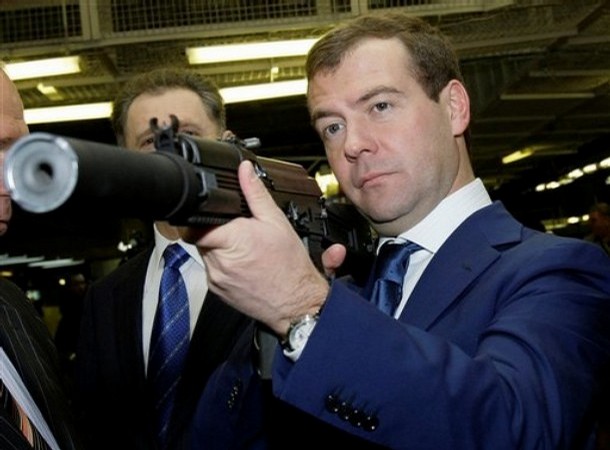
Opening Salvos of a New Gas War: Russia Versus the EU and Ukraine
Publication: Eurasia Daily Monitor Volume: 6 Issue: 59
By:

The Ukrainian – EU agreement on renovating the main Ukrainian gas trunk pipeline signed in Brussels on March 23 was greeted with a virulent reaction from Moscow. Russian Prime Minister Vladimir Putin, who runs his countries gas sector with an iron fist, threatened to "review" existing gas supply contracts and prices with EU states and Ukraine (UNIAN press agency March 24) as well as relations with the EU and Ukraine. The ostensible reason for Putin’s reaction was that Russia was not included in the deal.
According to the EU-Ukrainian agreement, the EU would allocate $2.57 billion towards the renovation of the pipeline. Ukrainian Prime Minister Yulia Tymoshenko asked that the renovation include expanding the present through-put capacity of 145 billion cubic meters of gas annually by 58.6 billion. The deal includes a basic demand put forth by Ukraine that EU gas companies would now buy Russian gas at the Ukrainian-Russian border and pay Ukraine the transit fee.
This would de-facto integrate the Ukrainian pipeline into the EU gas transportation system, a major defeat for Putin’s conception of creating a gas pipeline consortium with Russian participation which would manage the Ukrainian system, but allow Ukraine to maintain ownership of the pipeline. However, the Putin plan called for Russia to insure the transit of its gas to Europe through Ukraine with Russia paying Ukraine the transit fee.
The vice chairman of the European Regulators’ Group for electricity and gas (ERGEG), Walter Boltz, told the newspaper Kommersant on March 25, "In reality there are no reasons why Russia should insure transit (of gas) and why we shouldn’t pay for transit. We buy gas at the Ukrainian-Russian border and worry about its delivery ourselves. I believe there is no alternative."
At the heart of the matter are a number of issues vital for Russian interests; maintaining its gas hold over Europe and its geopolitical goal of bringing Ukraine into Russia’s sphere of influence. If the through-put capacity of the Ukrainian pipeline is expanded by almost 60 billion cubic meters there would be no commercial justification for building either the Nord Stream or South Stream pipelines. The cost of upgrading the Ukrainian pipeline is estimated at about $5-7 billion, far less than the estimated $12 billion needed to build Nord Stream and the $13 billion needed for South Stream.
In his reaction to the EU-Ukraine agreement to expand the Ukraine pipeline, Putin lashed out by asking the far from rhetorical question: "Nobody asked us if we are ready to transport such quantities (of gas)" (UNIAN, March 24). Was this a threat or a bluff by Putin, the hidden CEO of Gazprom? More likely than not, it was an emotional outburst based on rational fear. If Nord Stream and South Stream are doomed by an expansion of the Ukrainian pipeline, then the Nabucco pipeline might become far more acceptable for those EU member states who had already signed up for South Stream.
With European demand for Russian gas down by 40 percent in February 2009 from a year ago, Gazprom is now caught in a dangerous cash flow situation and has already warned that it would reduce its vitally needed investment program into exploring for new fields -yet the company continues to pour money into building its new skyscraper in St. Petersburg and announced that it would take its option on buying from Italy’s ENI the remaining 20 percent of Gazpromneft at the current price of $2.1 billion in April 2009 (Kommersant, March 25).
Putin’s threat to unilaterally "review" the price of gas for the EU and Ukraine is a more direct form of intimidation. This can be done only if Russia decides to abandon the existing price based on oil products and devises a new pricing formula, one based on political and financial considerations convenient to Gazprom.
By March 25, the pressure mounted on the Ukrainian government. Russian President Dmitri Medvedev told the Russian National Security and Defense Council that he was cancelling "indefinitely" a meeting between Russian and Ukrainian negotiators to discuss, among other matters, a loan request for $5 billion from the Ukrainian side. Part of the $5 billion was to be used by Ukraine to pay Russia for gas purchases in 2009 (Kommersant, March 25).
In the meantime, Yulia Tymoshenko headed to Japan for a meeting with Japanese corporations and banks to discuss possible loans and greater Japanese investments into Ukraine (Ukrayinska Pravda, March 25) Tymoshenko can well be looking to Japan to extricate her from a potentially embarrassing refusal by Russia to lend her government $5 billion for which has personally lobbied.
Within Ukraine, the agreement with the EU was instantly criticized by the largely pro-Russian Party of Regions. The shadow cabinet’s energy minister, Yuriy Boyko, went on the air where he supported Putin’s views and argued that "Without the full inclusion of Russia, the main supplier (of gas) it is impossible to guarantee that the Ukrainian gas transportation system will receive any gas. Ignoring Russia’s concerns is contrary to Ukraine’s interests" (Ukrayinska Pravda, March 23).
Despite Boyko’s reservations, most energy analysts see the agreement as a major breakthrough in cleaning up the murky, corruption ridden gas transport schemes which some attribute to Boyko and his constant lobbying of shady middleman schemes. What is certain is that Gazprom and Vladimir Putin will fight this new arrangement tooth and nail in order to keep the Ukrainian pipeline system linked as close as possible to the Kremlin in order to prolong the millions of dollars of hidden rents which benefit both Russian and Ukrainian elites.




